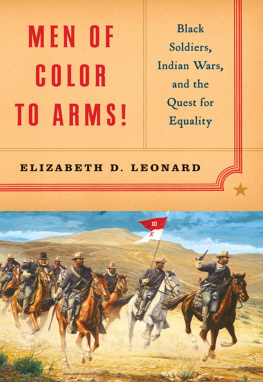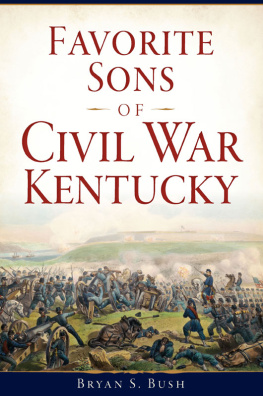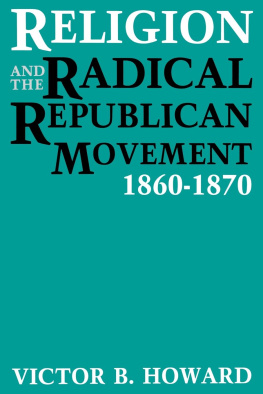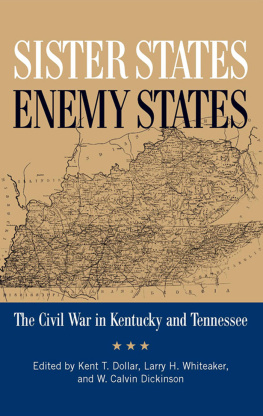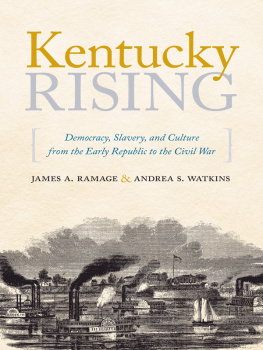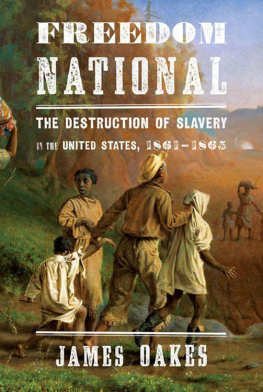
Slaves, Slaveholders, and a Kentucky Communitys Struggle toward Freedom
Slaves, Slaveholders, and a Kentucky Communitys Struggle toward Freedom

ELIZABETH D. LEONARD

Due to variations in the technical specifications of different electronic reading devices, some elements of this ebook may not appear as they do in the print editions. Readers are encouraged to experiment with user settings for optimum results.
Copyright 2019 by The University Press of Kentucky
Scholarly publisher for the Commonwealth,
serving Bellarmine University, Berea College, Centre College of Kentucky, Eastern Kentucky University, The Filson Historical Society, Georgetown College, Kentucky Historical Society, Kentucky State University, Morehead State University, Murray State University, Northern Kentucky University, Transylvania University, University of Kentucky, University of Louisville, and Western Kentucky University.
All rights reserved.
Editorial and Sales Offices: The University Press of Kentucky
663 South Limestone Street, Lexington, Kentucky 405084008
www.kentuckypress.com
Library of Congress Cataloging-in-Publication Data
Names: Leonard, Elizabeth D., author.
Title: Slaves, slaveholders, and a Kentucky communitys struggle toward freedom / Elizabeth D. Leonard.
Description: Lexington, Kentucky : The University Press of Kentucky, [2019] | Includes bibliographical references and index.
Identifiers: LCCN 2018047829 | ISBN 9780813176666 (hardcover : alk. paper) | ISBN 9780813176680 (pdf) | ISBN 9780813176673 (epub)
Subjects: LCSH: Holt, Sandy, 1824?-1896. | African AmericansKentuckyBiography. | African American soldiers19th centuryBiography. | SlavesKentuckyBiography. | Holt, Joseph, 1807-1894. | SlaveholdersKentuckyBiography. | JudgesUnited StatesBiography. | KentuckyRace relationsHistory19th century. | United StatesRace relationsHistory19th century. | African American soldiersHistory19th century. | SlavesEmancipationUnited States. | United StatesPolitics and government1849-1877.
Classification: LCC E185.93.K3 L46 2019 | DDC 306.3/62092 [B] dc23
LC record available at https://lccn.loc.gov/2018047829

| This book is printed on acid-free paper meeting the requirements of the American National Standard for Permanence in Paper for Printed Library Materials. |
Manufactured in the United States of America.

| Member of the Association of University Presses |
To my wonderful sons,
Anthony Bellavia and Joseph Bellavia,
and to all who continue the struggle
for social justice in grim, dispiriting times.
Contents
Preface
Some years ago, an African American student at the college in Maine where I teach undertook an independent study with me in which she strove to trace the details of her familys centuries-long history in America. Given that my Arkansas-born students direct ancestors were enslaved people in the American South, we were curious to see how much specific and reliable information we could find. We used whatever archival and other primary sources we could get our hands on, which included many of the excellent databases of digitized material now available via the Internet. My student also talked extensively with living family members and traveled back to Arkansas for a week to conduct in-person research at various local historical societies. It was a hard slog. In the end, despite our shared determination and my professional training and experience, we found only a small portion of what we had hoped to uncover, especially once we tried to reach back beyond the 1870 federal census, the first to identify recently emancipated black Americans by name and the men, at least, as citizens.
In the course of our work together, my student and I periodically deviated from our central project to compare how easy it was for me to find abundant, detailed information about my always-free white familys history, particularly the history of the Leonard line (my fathers), whose roots in America extend to the 1600s. (My maternal grandparents, who came here as impoverished immigrants from Italy and Hungary at the turn of the twentieth century, posed a much greater challenge.) There are many publicly available sources for learning about the Leonards, who, from generation to generation, continued to acquire wealth, security, and enhanced social status. They also carefully preserved and then privately handed down stuff that contains valuable datanot least a massive Bible from the late 1700s replete with notations pertaining to family births, deaths, marriages, and more. My student had no such stuff for reference: since before emancipation down to the present time, her family members have remained overwhelmingly poor and geographically scattered, moving frequently and accumulating little in the way of material goods they considered of historical or even sentimental significance. Doing this independent study together was fascinating and frustrating. It highlighted for us both that while scholarship in African American history has made great progress over the last fifty years, the obstacles to complete understanding remain enormous when compared to the history of always-free, literate, middle-class and elite white Americans, especially men.
Which brings me, in a roundabout way, to Slaves, Slaveholders, and a Kentucky Communitys Struggle toward Freedom, for which the research experience has been, on a far grander scale, as fascinating and frustrating as it was for that independent study project. This is because of the magnitude of the enduring obstaclesfirst and foremost the gaps in the sourcesthat remain when trying to understand fully the stories of the African Americans who figure here, in contrast with the well-preserved, well-documented stories of the whites with whose lives the African American characters lives were inextricably interwoven. The result is a story that is, ultimately, somewhat lopsided in the amount of detail it can present for some individual characters relative to others. Like my students family history project, however, the story I have been able to craft from the available sources is illuminating nevertheless. I cheerfully encourage others to do what they can to take the story further, and deeper, than I have been able to do.
This book has two primary goals. First, it offers a close-up look at a few dozen slaves from Breckinridge County, Kentucky, who served in Company A of the 118th United States Colored Troops (USCT), mapping the courageous but also jagged and sometimes surprising journeys these men took from slavery through the Civil War and on into a postwar world where they hoped to capitalize on the promises of Union victory. A number of historians have studied the broad contours of black mens Civil War military service: classics by George Washington Williams (A History of the Negro Troops in the War of the Rebellion) and Dudley Taylor Cornish (The Sable Arm
Next page


